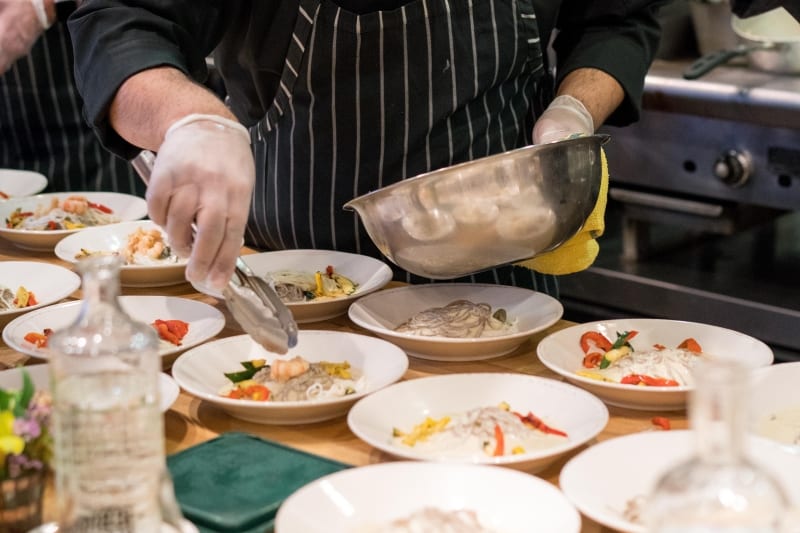This article was issued by the Event Greening Forum, a non-profit organisation that promotes sustainability within the business events sector.
Roughly one third of all food produced ends up as waste. As a result, of the 31 million tonnes of food we produce in South Africa each year, 10 million tonnes ends up in the bin.
This is an unsustainable system which we need to address urgently. Why? Because:
- It is estimated 13 million South Africans experience hunger every day²;
- Malnutrition is often linked to disease and premature death³;
- The world’s population is growing – and we will likely need to feed 9.8 billion people by 2050⁴;
- Agriculture uses 70% of all freshwater withdrawals from rivers, lakes and aquifers⁵, and in a water scarce country we cannot afford to waste water;
- Agriculture is also responsible for a significant amount of greenhouse gas emissions (it is estimated that lost and wasted food accounts for about 4.4 gigatons of carbon dioxide each year, which amounts to a little less than road transportation emissions¹);
- In South Africa, 90% of waste goes to landfill², and organic waste that goes to landfill doesn’t compost but releases methane, a potent greenhouse gas, and leachate, a toxic liquid which can contaminate our underground water supplies;
- The Council for Scientific and Industrial Research estimates that R61.5 billion is lost each year, in the form of wasted food.
Food loss happens along the entire food production chain, due to pests and poor harvesting methods at production; challenges around transportation, storage and packaging; discarding food reaching its sell-by date in the retail industry; and consumers at home.
The event and hospitality industries are also guilty of food waste, usually in the form of over-catering. However a number of players have woken up to the problem, and are finding ways to solve it.
The Vineyard Hotel
Carl van Rooyen, the Executive Chef at the Vineyard Hotel in Cape Town, says:
- Catering for multiple events at the same time that each have different menus leads to more waste. He encourages events to agree to the same menu, and share the buffet set up.
- Similarly, too much variety also leads to more waste. Harvest tables are a great solution, as gusts can pick and choose dishes with simple ingredients. This accommodates different tastes and dietary requirements.
- Live cooking stations are also an elegant solution to custom-cooking to a guest’s needs.
- Surplus food prepared for an event can be blast chilled in small portions, which can be easily heated and served if needed – or kept for a later date if not needed.
Conduct an audit to establish where the bulk of the food waste is originating from.
South African Chefs Association
Simoné Harris, a lecturer at South African Chefs Association, recommends the following:
- Conduct an audit to establish where the bulk of the food waste is originating from, so you can prioritise where you focus your efforts.
- Ensure your chefs are trained to follow recipes cards accurately, and are conscious of what stock they have available to work with.
- Monitor food portion sizes so that plated food is not excessive.
- Re-purposing excess unserved food. For example, roasted peppers can be used to make hummus, and bones can be made into stock for freezer friendly soups.

GingerBiscuit
Lisa Jade Hutchings, a sustainability consultant and founder of GingerBiscuit, says:
- Confirm your guest numbers with the venue in advance of the event, as well as any dietary requirements, to help them avoid over catering.
- Use smaller plates for buffets, so people don’t take more than they can eat.
- Work with your chosen venue or catering company to design a low-waste menu – such as the one ingredient menu Chef Peter Langa at Maropeng created for an Event Greening Forum dinner.
Work with your chosen venue or catering company to design a low-waste menu.
Potters Hand Activations
Katja Schmidt, the Managing Director of Potters Hand Activations, organises corporate events. Her advice is:
- Confirm final numbers attending the event at 20% less than the actual number of guests who have RSVPed. This is because the dropout rates at most non-paying events tends to be high.
- Ensure any unserved leftovers are given to the staff working at the event or a local charity.
SA Harvest
SA Harvest is a Non-Profit Organisation that will collect and redistribute quality surplus food to hungry South Africans through feeding schemes, homeless shelters, schools and more. Andrew Wilson, the Cape Town Manager, encourages event planners to contact him a few days before an event, to let him know what kind of food and quantities you anticipate will be leftover, as well as who their contact person will be for the collection. They will then handle everything from there for you.
They have the right system in place to ensure the cold-chain is not broken, and that any food they redistribute will be safe for human consumption. Wilson adds that they do not have a minimum quantity and are more than happy to take small donations.
SA Harvest is a Non-Profit Organisation that will collect and redistribute quality surplus food to hungry South Africans through feeding schemes, homeless shelters, schools and more.

Earth Probiotic
Gavin Heron, the Director of Earth Probiotic, recommends composting the organic waste from an event. This includes both the kitchen scraps from the food preparation stage, as well as uneaten food that has been dished up and cannot be redistributed. His on-site composting service uses bokashi to break down organic waste that is not normally easily composted (such as cooked and uncooked meat, dairy and sea food), while also eliminating odours. The compost is then used for vegetable gardens, and helping to produce more food.
The Department of Environmental Affairs and Development Planning has a ten-year plan in place to divert all organic waste from landfill. It launched in 2017, so by 2027 it will be mandatory for all businesses to find an alternative solution such as this one.
References:
1. Food and Agriculture Organisation (FAO) of the UN
2. WWF’s report ‘The truth about our food waste problem’
3. The World Counts – Wasted food statistics
4. United Nations
5. UNESCO




